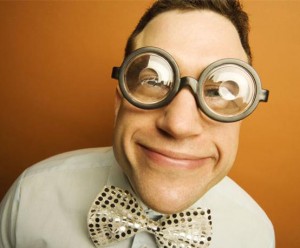High Index Eyeglasses and Their Psychological Impact
Perceptions about eyeglasses have changed since the 1950s and 1960s. Back then, the unworldly, unpopular, and uncool nerd was commonly portrayed by Hollywood as a disheveled person with thick rimmed glasses and thick lenses that distorted the eyes. The person was typically portrayed as an inventor, scientist, or some misunderstood genius. Sometimes, the person was the target of bullies. Amid the connotations of this stereotype such as frailty, bookishness, and passiveness, is a positive connotation that lasts to this day: intelligence.
Then as now, intelligence is a positive trait that people value. This is especially true today where intelligent, glasses-wearing people such as Bill Gates have transformed the world. Studies have uncovered other positive attributes associated with wearing eyeglasses: industriousness and dependability. Intelligence, industriousness, and dependability are valuable assets to have in any employee. This is why qualified candidates who wear glasses have a better chance of being hired in a job interview.
The Problem with High Prescription Glasses
As long as the prescription level isn’t too high, most people who wear glasses benefit from the positive psychological associations discussed above. However, this can’t be said of high prescription glasses that distort the eyes and face. Part of the reason for the greater acceptance of glasses is their improved stylishness. But no amount of styling offsets the effect of coke bottle lenses, magnified eyes, or shrunken eyes. This effect often elicits the old negative stereotyping.
Another problem is that these lenses interfere with the non verbal communication that occurs with the eyes. People unconsciously express their attitude and feelings through their eyes. At the same time, people unconsciously pick up on these “eye signals” and interpret them correctly for the most part. This is why the eyes are considered the windows of the soul, and why eye-to-eye contact in social and business situations is important.
Through a lifetime of interpersonal interactions, our brains are trained to interpret the movement of the eyes and the facial muscles around them. When you cover the eyes and the surrounding part of the face with thick distorting lenses and the thick rims required to support them, the brain can’t read important unconscious signals. The person communicating with the wearer of thick glasses feels a certain psychological “distance.”
For the person wearing thick eyeglasses, gaining trust may take longer and instantly relating to people becomes more difficult. Reading the eyes is also important in understanding the subtle nuances of expression. It’s how people communicate that they’re being ironic, sarcastic, or expressing light humor. It’s also how they communicate their forthrightness. This “masking” of non verbal cues can affect one’s success in many types of careers.
How High Index Eyeglasses Help
High index eyeglasses are made from materials with a high index of refraction. This makes them more efficient at bending light than ordinary lens materials. Therefore, they require less lens material to correct vision problems. This results in thin and relatively flat eyeglass lenses that don’t magnify, shrink, or otherwise distort the eyes of its wearers. In addition, the thin and lightweight lenses don’t require thick rims to hold them securely in place. Thinner rims allow easier viewing of the face surrounding the eyes. In fact, high index eyeglasses may be made thin enough to accommodate the rimless style of glasses. This virtually eliminates the previously mentioned problems.
If you wish to reap the psychological benefits of eyeglasses in business and social situations without them becoming a distraction or preventing you from relating nonverbally with your eyes and face, high index eyeglasses with the right rim style are the solution.
However, you should make sure the lenses have an anti-reflective coating. This virtually eliminates the high reflectivity of high index lens materials. Without the anti-reflective coating, light reflections off your eyeglass lenses will make your eyes less visible to others and get in the way of your interactions with them. For information about selecting high index eyeglasses that best suit your needs, please contact us.


Leave a Reply
You must be logged in to post a comment.